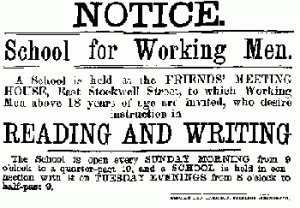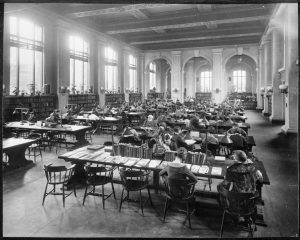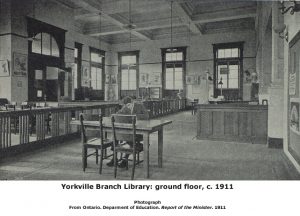The History of Adult Education in Canada: The Age of the Great Transformation (1880-1929)
Rooted in the evolution of Canadian society, the development of Adult Education has proven to be a critical component in the shaping of major social, political, and economic events throughout history. Delving into the specific time period of The Age of the Great Transformation (1880-1929), characterized by a “tumultuous and intensely creative period of adult learning” (Welton, 2013), we can begin to grasp the relationship between knowledge and power.
During the Age of the Great Transformation, a significant shift towards the importance of inclusion, opportunity, and proactive change was evident in the mindsets of many Canadians. As Welton (2013) outlines, the emergence of corporate capitalism resulted in the exploitation and neglect of farmers, workers, and women. Prior to this period, opportunities for learning and the subsequent acquisition of knowledge were limited to society’s elite members. By bringing attention to this disparity of learning, Canadians began to embody the idea of “knowledge for the people” (Welton, 2013) as means for both individual and collective socioeconomic growth. The educational opportunities which arose during this period were largely rooted in the desires to solve a myriad of issues which plagued the middle and working classes; through the fight for improved livelihood, the importance of learning and the development of associations and organizations led to a transformational step in Adult Education.
Social, Political and Economic Factors of The Age of the Great Transformation
At this time, communities were still quite small and “largely rural” (Welton, 2013) where farming and fishing were prevalent, and work camps were implemented in order to meet the economic needs of capitalistic leaders. The brutality of the working conditions at such camps led to the formation of “organized unions” (Welton, 2013) where one particular advocate, Alfred Fitzpatrick, highlighted the value of these workers’ lives and promoted their engagement in learning. As seen in Figure 1, notices were posted to advertise programs for workers aimed at developing practical skills in their field while also prioritizing the acquisition of literacy.
The theme of overcoming social issues also presented itself in various women’s movements as they “confronted their exclusion from full participation in society and their lack of status as persons” (Welton, 2013). On a political level, socialist parties emerged and provided people with an opportunity to voice their opinions, share knowledge, and discuss solutions in order to bring awareness to the State’s lack of social programs. As the desire for fair governance persisted, Educative Democratic Forums were introduced in which learning was of utmost priority.
The Emergence of New Learning Systems & The Impact on Women and Workers
Groups aimed at improving the lives of women, farmers, and workers were at the forefront of the development of Adult Education. As women increasingly desired to gain more prominent roles in society, the introduction of “more voluntary associations” (Welton, 2013) coupled with the emergence of “literary societies, suffrage organizations, Women’s Institutes, Homemakers’ Clubs, the Women’s International League for Peace and Justice, the Women’s Christian Temperance Union, the Women’s Grain Growers Association, and the Political Equality League” (Welton, 2013) led to immense learning opportunities. Not only were these women learning practical life skills, but further, they were gaining knowledge on unjust legislation excluding them from land ownership and their ability to vote. Learning materials became increasingly available as cities across the nation introduced public libraries and educational institutions such as Frontier College (1899) and The University of British Columbia (1908) were created. As seen in below in Figures 2 and 3, the Toronto Public Library, which opened in 1884, provided people with both reading rooms and lecture halls.
In 1909, night-school programs were offered for adults in Vancouver which offered practical classes aimed at improving the skills of workers. As outlined in the Antigonish movement, apprenticeship programs were introduced within work camps and study groups were established within communities in order to promote group-learning. The implementation of educational programs and availability of literacy materials, coupled with the formation of social groups during this time led to strides in Adult Education that we see today.
Concluding Remarks
As university students, we are privileged with numerous opportunities for our own personal growth and professional development. In analyzing the events of Canadian history within Adult Education, it becomes apparent how imperative and impactful learning is within our ever-changing society. By making connections between the expansion of Adult Education and societal shifts, such as the introduction of democracy, the importance of social justice, and the economic opportunities that presently exist, the value of both teaching and learning can be propelled through future generations.
References
Byinfed.org, P. (2020, March 09). Adult schools and the making of adult education. Retrieved January 31, 2021, from https://infed.org/mobi/adult-schools-and-the-making-of-adult-education/
History of Children’s Services : History of Toronto Public Library. (n.d.). Retrieved January 31, 2021, from https://www.torontopubliclibrary.ca/about-the-library/library-history/history-of-childrens-services.jsp
A History of the Toronto Public Library in Four Buildings. (2020, September 01). Retrieved January 31, 2021, from https://activehistory.ca/2020/09/a-history-of-the-toronto-public-library-in-four-buildings/
Interactive Timeline of Canadian Adult and Higher Education: Adult Educator Weekly: January 2021 (63D). (n.d.). Retrieved January 31, 2021, from https://blogs.ubc.ca/adhe412january2021w63d/interactive-timeline-of-canadian-adult-and-higher-education/
Spencer, B. & Lange, E. (2014). Chapter 1: Education for adults: Exploring the foundations. In B. Spencer & E. Lange, The purposes of adult education, (pp.1-26), Toronto: Thompson Educational Publishing.
Unit 3 – Video interviews: Adult Educator Weekly: January 2021 (63D). (n.d.). Retrieved January 31, 2021, from https://blogs.ubc.ca/adhe412january2021w63d/unit-3-video-interviews/
Welton, M. (2013). A bird’s eye view of Canadian adult education history. In T. Nesbit, S.M. Brigham, N. Taber & T. Gibb (Eds.) Building on critical traditions: Adult Education and learning in Canada, (pp. 19-28), Toronto: Thompson Educational Publishing


